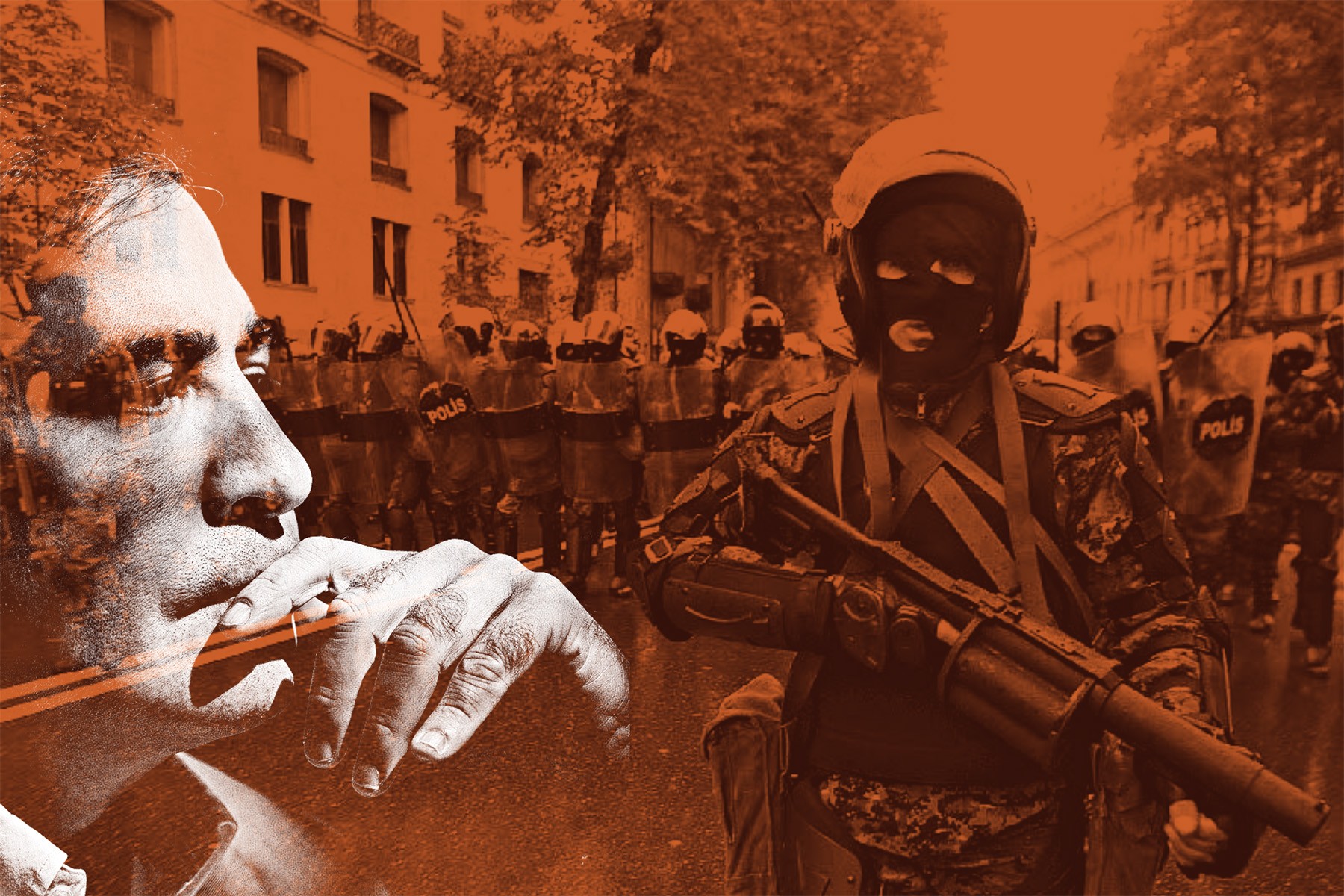
Third Georgian President Mikheil Saakashvili (2004–2013) stands accused of ordering a crackdown on anti-government protests and raiding TV station Imedi.
Minutes after 07:00 on the morning of 7 November 2007, Georgian police units cleared around 200 protesters from outside Parliament, triggering a chain of events that would culminate in President Saakashvili’s resignation 18 days later.
In addition to breaking up larger street demonstrations in Tbilisi later that day, the government also raided and shut down the opposition TV channel, Imedi, subsequently taking over its ownership.
The violence, according to Saakashvili, was a response to extraordinary circumstances — A Russian–backed coup led by the late Georgian tycoon and opposition leader Badri Patarkatsishvili. He still, however, denies personally calling the shots that day.
On 29 November, over 14 years later, for the first time in modern Georgian history, a former head of state was delivered to court to face trial.
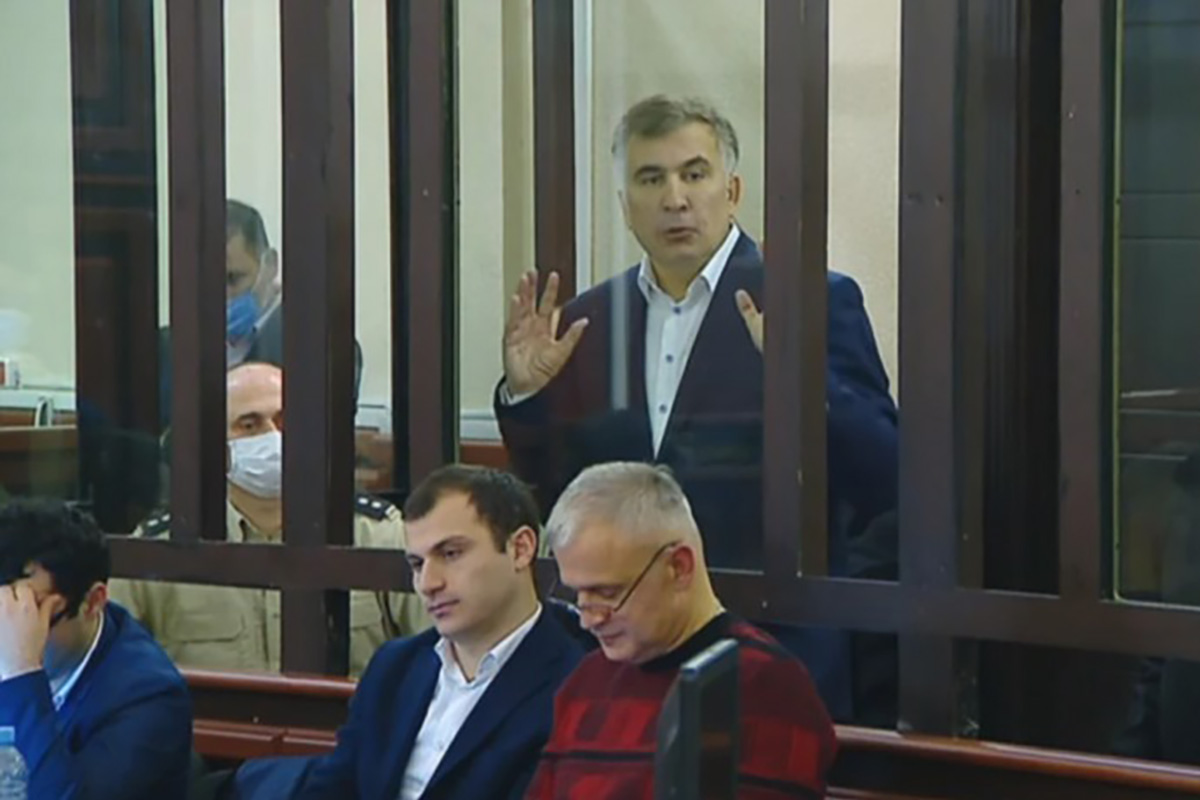
Saakashvili is accused of abusing his powers, including by using the military against anti-government protests. He was charged under §2 and §3 of Article 333 of Georgia’s Criminal Code for ‘exceeding of official power’ — punishable by 5–8 years in prison.
The 2007 crackdown triggered a wave of local and international condemnations, including from international watchdog group Human Rights Watch and then–UN High Commissioner for Human Rights, Louise Arbour. It cost Saakashvili — his reputation as a democratic reformer was tarnished and he was also forced to call early presidential elections.
In January 2008, the popular leader of the Rose Revolution, who four years earlier was elected with 97% of votes, avoided a runoff with 56% of the vote.
The dispersal
By 7 November, the government had faced weeks of street protests calling for Saakashvili’s resignation and early parliamentary elections. The day began with the police moving in using heavy-handed tactics on the small gathering outside parliament, which included 16 hunger-striking opposition activists who had spent a night there.
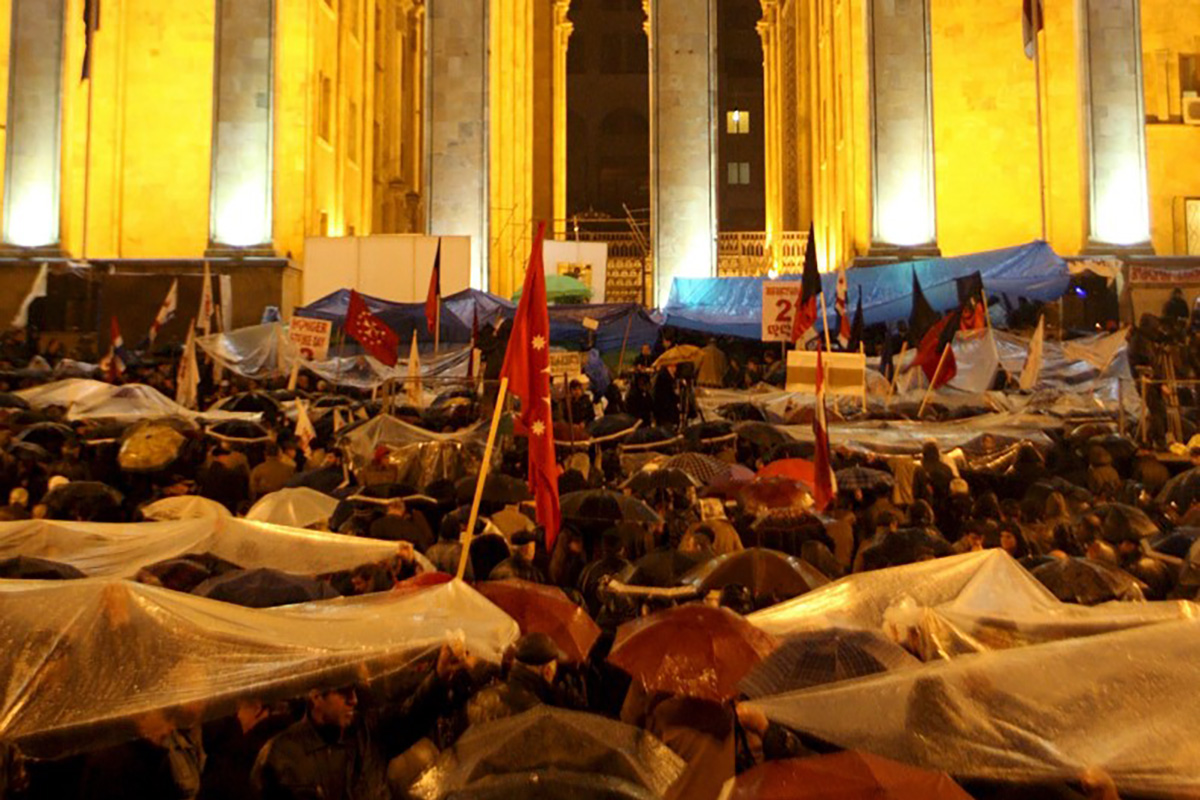
Shortly after, police deployed rubber bullets, tear gas, long-range acoustic devices, water cannons, and reportedly, even live ammunition against larger crowds that showed up on Rustaveli Avenue and at Rike Park, an area near the Mtkvari River embankment.
The dispersal resulted in at least 500 people needing medical attention, including three men severely injured with what appeared to be gunshot wounds, and another who ended up on life support as a result of head trauma sustained in a police beating.
Unlike the early morning use of force, police warned that special measures were to be used against larger crowds of protesters on Rustaveli Avenue. This did not help Goderdzi Sharashia, who was reporting for independent TV channel Mze live from the ground. Sharashia said he eventually managed to escape the carnage but tripped on the cable of another TV channel and fell.
‘I remember a small blue ball or something exploding and emitting gas right in front of my nose. I stood up, started to run again, but then I don’t remember anything’, he told OC Media.
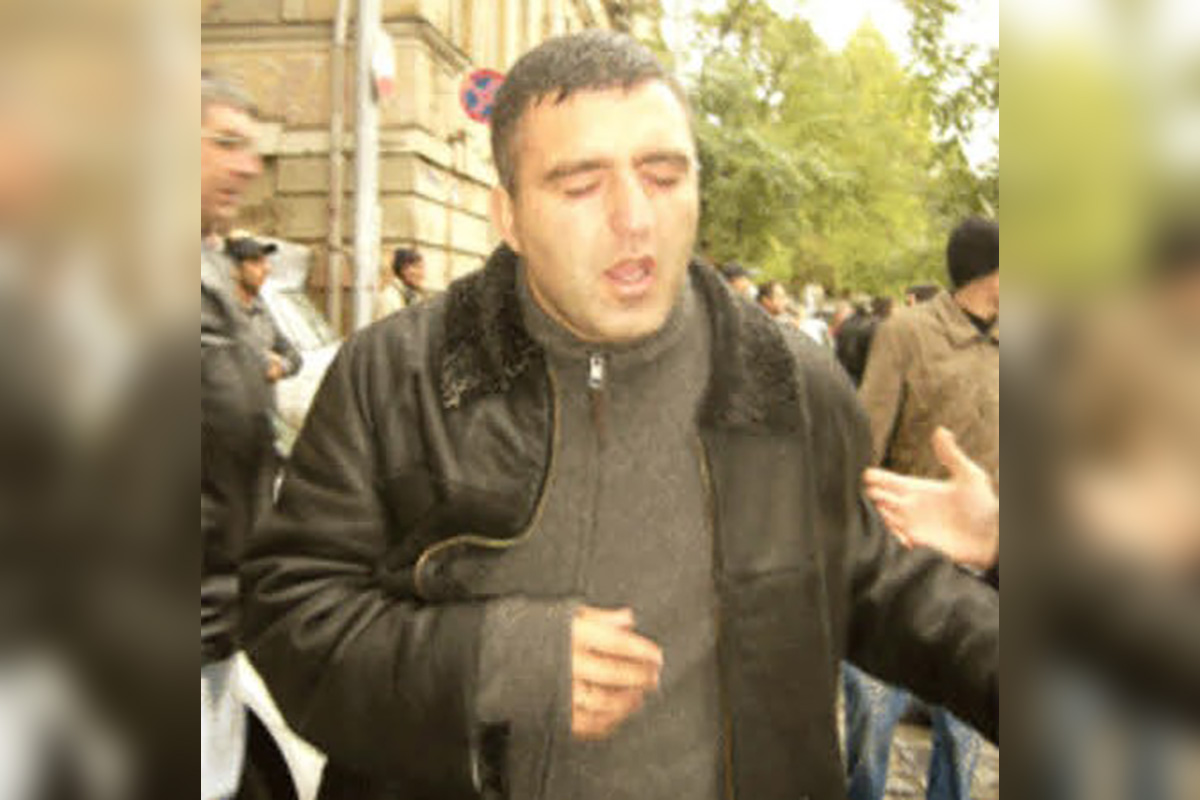
A number of reporters confirmed that police attacked them and damaged or confiscated their equipment, returning some later that day.
Some of the protesters pelted stones at oncoming police forces, smashed police cars, and beat up individual officers.
Near Rike Park, the authorities deployed red-dye water to mark protesters to arrest them later.
Giorgi Tevdorashivili, then 18, was among the three people to sustain the most serious injuries.
Tevdorashvili told OC Media on 13 December that he was shot in the leg with live ammunition as he was helping a younger boy who fell down near Rike during the dispersal.
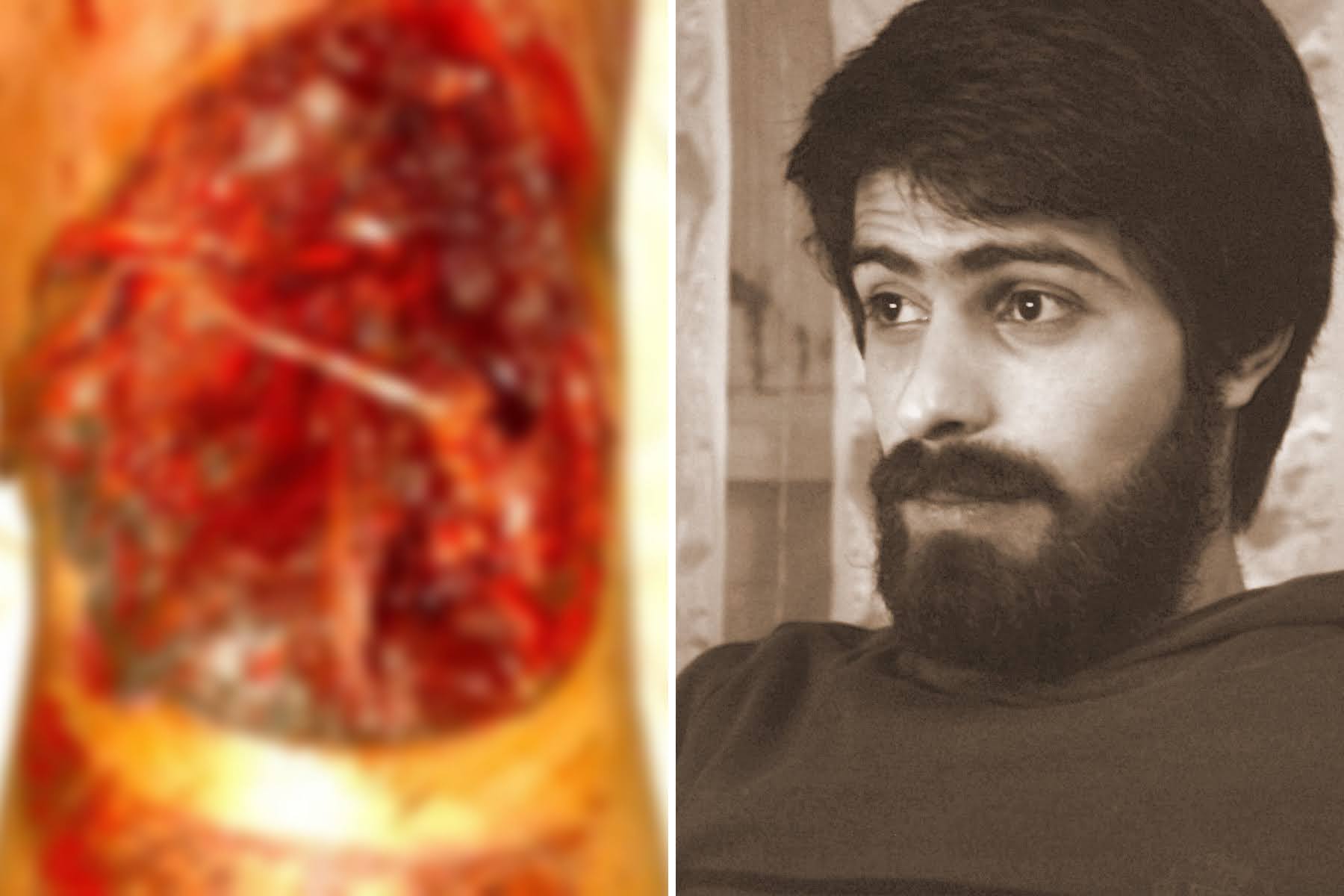
Giorgi Tevdorashvili, who was officially recognised as a victim by the authorities six years ago, told OC Media that while the government covered the costs of his surgery, his family had to campaign to raise money for his recovery costs.
Tevdorashvili, who was ‘crazy about football’ before the injury, said he never played again.
‘I still have problems [with my leg] when I have to cover a longer distance’, he said.
Nika Didishvili, who was also severely injured in his leg fleeing near Rike on 7 November, said he accidentally became part of the crowd that was ‘shot at’ and ‘besieged from all sides’ by police.
Didishvili said a bullet ‘entirely fractured’ his calf and ripped and burnt the nearby soft tissue.
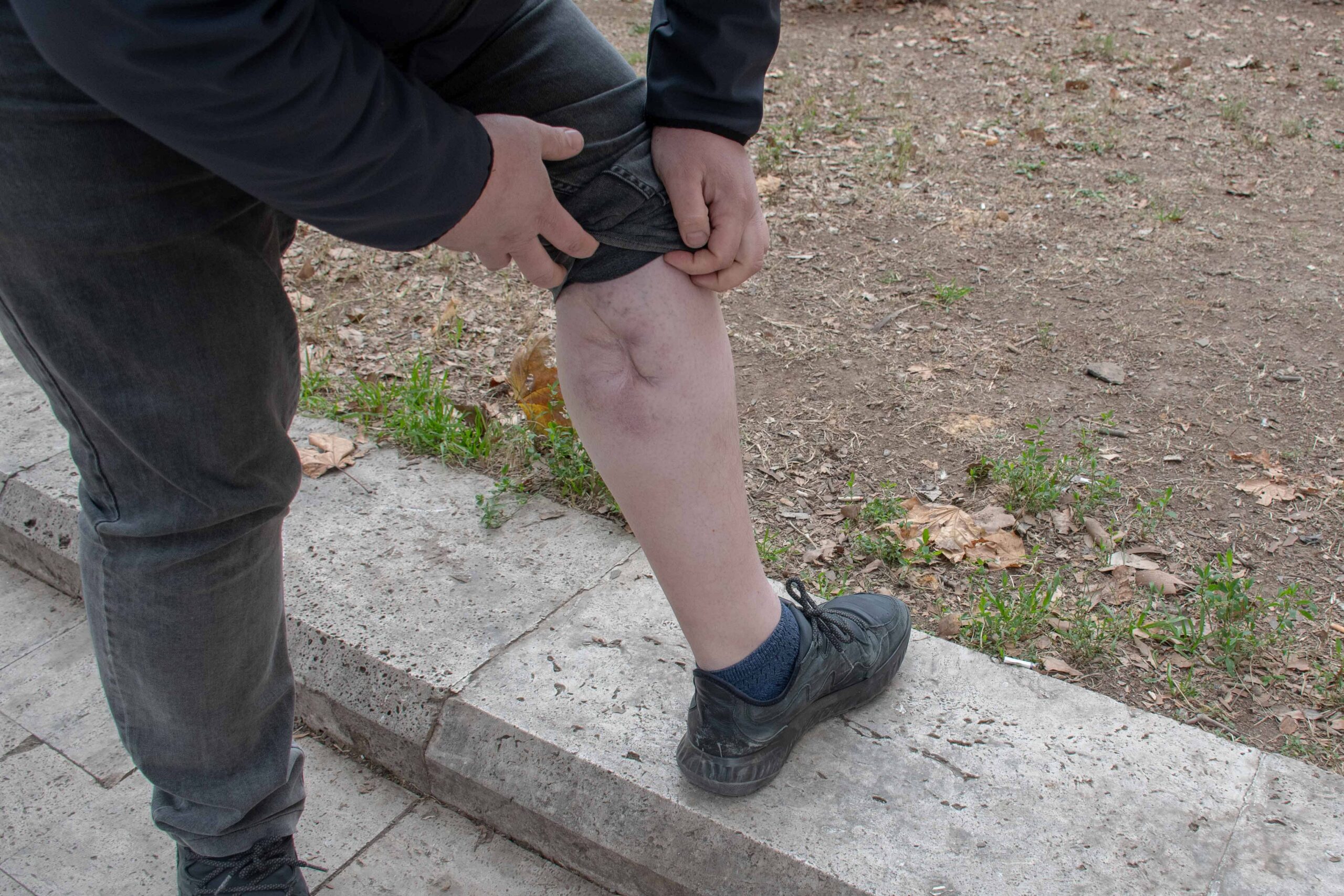
Both Tevdorashvili and Didishvili claimed that before their final injuries, both had been hit with rubber bullets which they described as far less impactful.
On the following day, police violently dispersed a group of students in Georgia’s Black Sea coastal city of Batumi as they protested the excessive force used by police in Tbilisi. Four students were hospitalised and one woman suffered a miscarriage.
‘The police looked like extremists’
On 7 November, police officers on many occasions chased protesters trying to find refuge in nearby streets and parks and forcefully entered private homes, hotels, and drug stores, ordering protesters to come out only to attack them again.
Law enforcement officers mostly used sticks and truncheons. Many of them were not in uniform.
Some chanted Mikheil Saakashvili’s name while others screamed ‘whores of uria!’, an anti-Semitic slur referring to opposition leader Badri Patarkatsishvili, whose background was Jewish.
Footage of 7 November 2007 from TV channel Kavkasia.
‘You get the impression that those individuals in the footage are members of an extremist political group instead of employees of the Interior Ministry’, the Georgian Public Defender noted in his 2008 report.
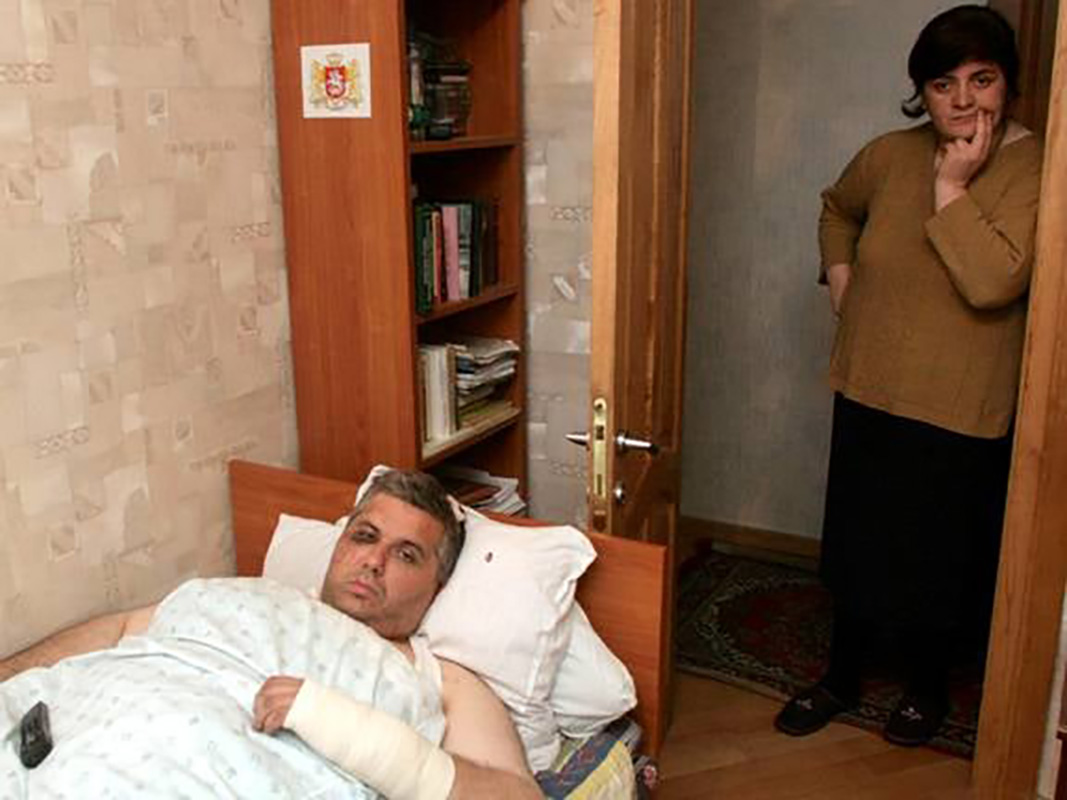
Also on 7 November, a unit of the Special Purpose Detachment of the Investigation Department of the Georgian Revenue Service beat up and kidnapped opposition leader Koba Davitashvili while he was buying equipment in Tbilisi to organise more street protests.
TV company stormed, pulled off the air, then seized
On the evening of 7 November, government forces stormed the offices of TV channel Imedi, which had been covering the protests throughout the day.
Levan Javakhishvili, who was on the air with co-anchor Sopo Mosidze, reported live as government units breached their premises. The Special Operative Department under the Interior Ministry pulled the broadcast from the air minutes later.
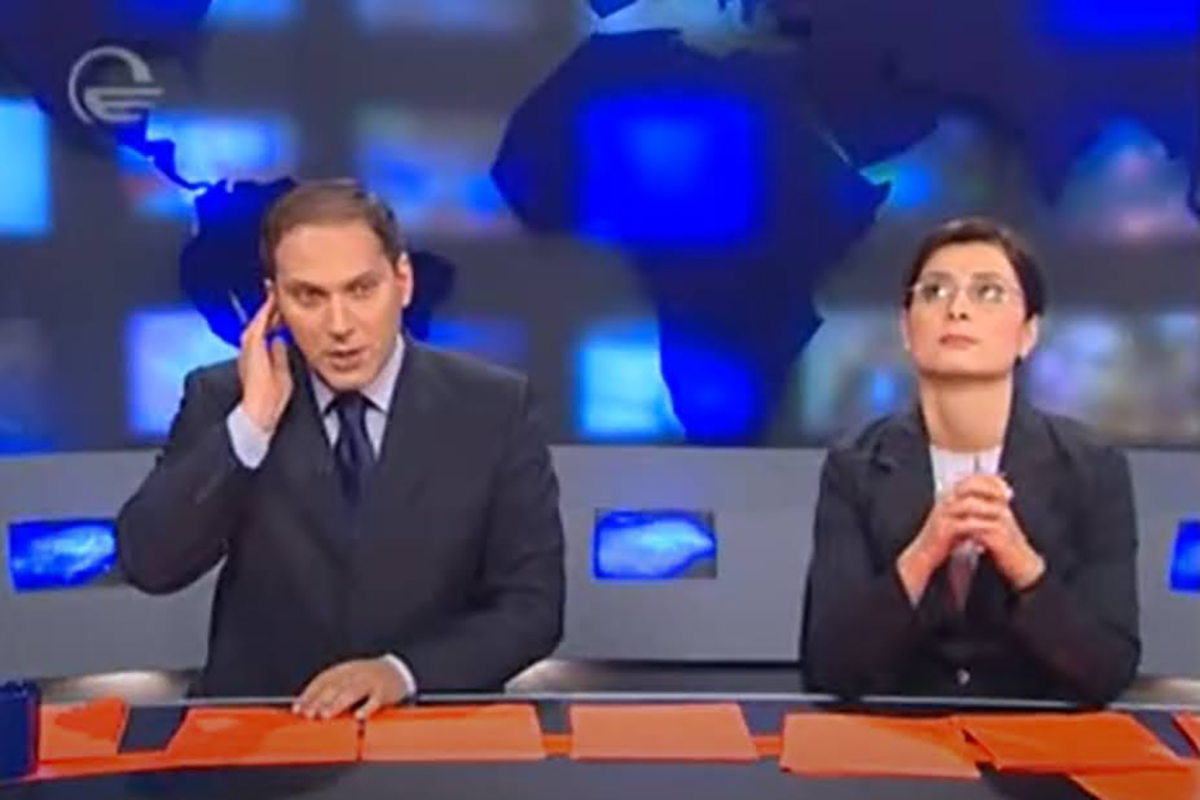
Law enforcement officers destroyed equipment, preventing the channel from resuming broadcasting for weeks. They held most of the journalists and company staff at gunpoint on the floor, hit them with truncheons, and shot rubber bullets at some of them after ejecting them from their offices.
‘I personally think it was a punitive operation against independent media, and also a punitive operation against their own people’, Levan Javakhishvili told OC Media on 13 December. ‘Given his psychological profile, this was, and I’m sure about it, was personally Mikheil Saakashvili’s decision.’
‘I definitely have the sense that the right person faces trial now, and he should serve the sentence he deserves’, Javakhishvili said, referring to the former president’s ongoing trial.
In 2014, former Parliamentary Speaker Nino Burjanadze testified that she had witnessed Mikheil Saakashvili discussing shutting down Imedi together with other officials.
That evening, the authorities also shut down TV channel Kavkasia, which was located in the same building as Imedi, as well as TV 25, an independent channel in Adjara, on the following day.
After shutting down Imedi, the authorities imposed an 8-day nationwide state of emergency, forbidding private TV stations from broadcasting any news programmes.
Imedi, however, was allowed to resume broadcasting only a month later, followed by months of financial and ownership uncertainties.
Shortly after Badri Patarkatsishili’s death from a heart attack in 2008, his step-cousin, Joseph Kay, gained access to some of his assets, effectively blocking Patarkatsishvii’s family from controlling his estate, including Imedi and the lucrative Mtatsminda Park in Tbilisi.
While the legal battles over the estate dragged on for years Imedi’s editorial policy changed quickly under Giorgi Arveladze, a former economy minister under Saakashvili’s government.
‘After the unfortunate death of the founder, Badri Patarkatsishvili, it was clear how the Imedi case would be handled’, Levan Javakhishvili said.
Javakhishvili left the company soon after its offices were stormed, returning in 2012 when ownership was ‘returned to its proper owner’.
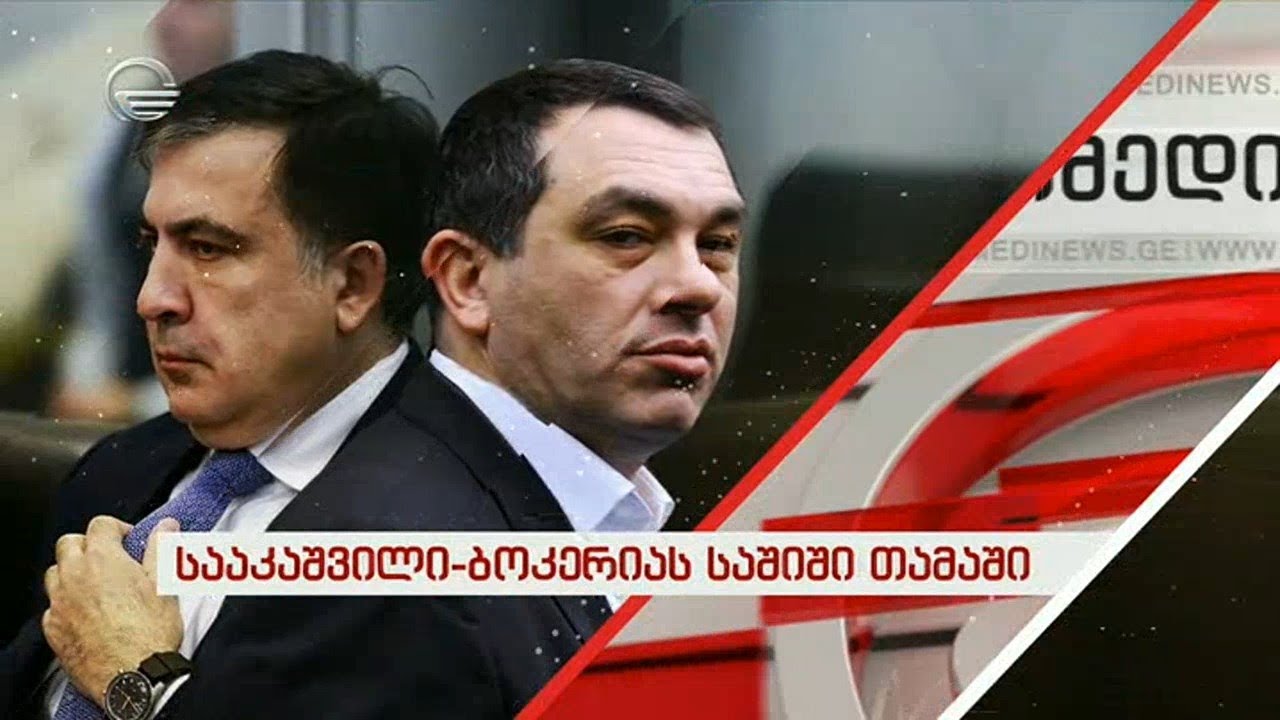
Imedi was returned to the Patarkatsishvili family after Mikheil Saakashvili and his United National Movement (UNM) party were ousted from power in 2012.
November 2007 — a tipping point
What prompted Saakashvili’s government to go on the final offensive against Imedi, at least according to Georgian prosecutors, was an interview with one of Saakashvili’s oldest allies, former Defence Minister Irakli Okruashvili.
In the September 2007 interview, Okruashvili accused President Saakashvili of ordering the murder of Badri Patarkatsishvili.
Patarkatsishvili was a billionaire who made his fortune in Russia following the collapse of the Soviet Union. A long-time associate of Russian oligarch Boris Berezovsky, he repatriated to Georgia after becoming wanted by Russian authorities in 2001 for organising an attempted escape of an associate from police custody.
Patarkatsishvili came at loggerheads with Saakashvili, who was himself swept to power thanks to street protests largely informed by opposition-leaning media, after 2005. The conflict between the two heated up further still in 2007, when Patarkatsishvili began openly financing key opposition groups in Georgia.
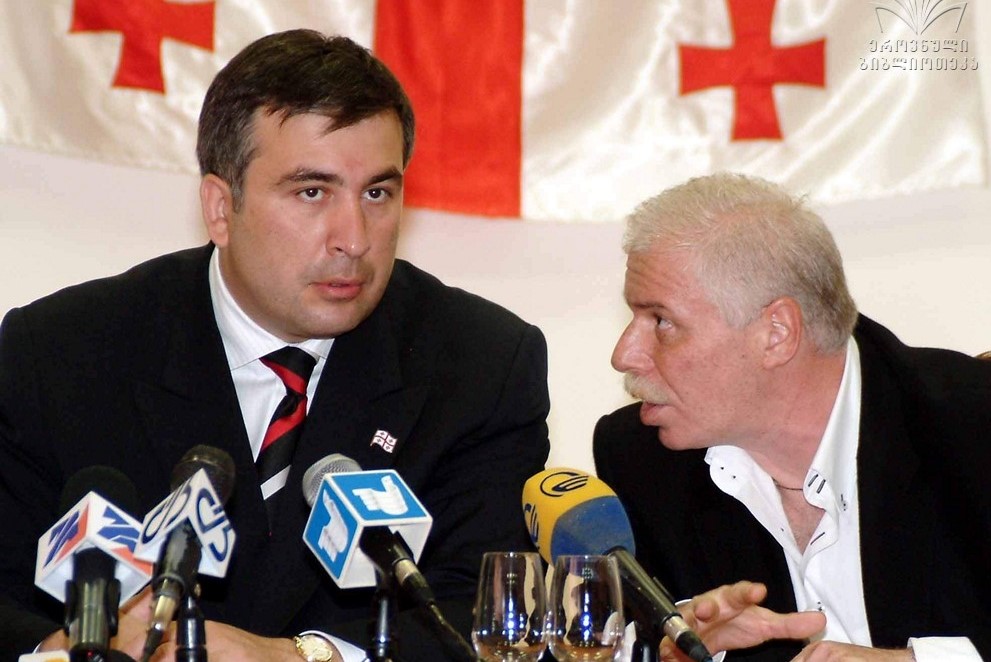
According to the investigation, in the run-up to the breaking up of street protests and storming of Imedi, Saakashvili unsuccessfully tried to convince the businessman to give up the channel.
Patarkatsishvili soon faced corruption charges and was pushed out from leadership positions at the Georgian Business Federation and Georgian National Olympic Committee.
After the 7 November dispersals, the Interior Ministry and General Prosecutor’s Office followed up with charges of attempting a coup and terrorism against Patarkatsishvili.
Imedi was responsible for several major exposés on abuses of power before they aired Okruashvili’s scandalous interview.
A February 2006 report on the murder of Sandro Girgvliani by State Security Service officers earlier that year was among the biggest scandals. It triggered a popular campaign for justice for Girgvliani, led by his grieving mother Irina Enukidze, who died the following year.
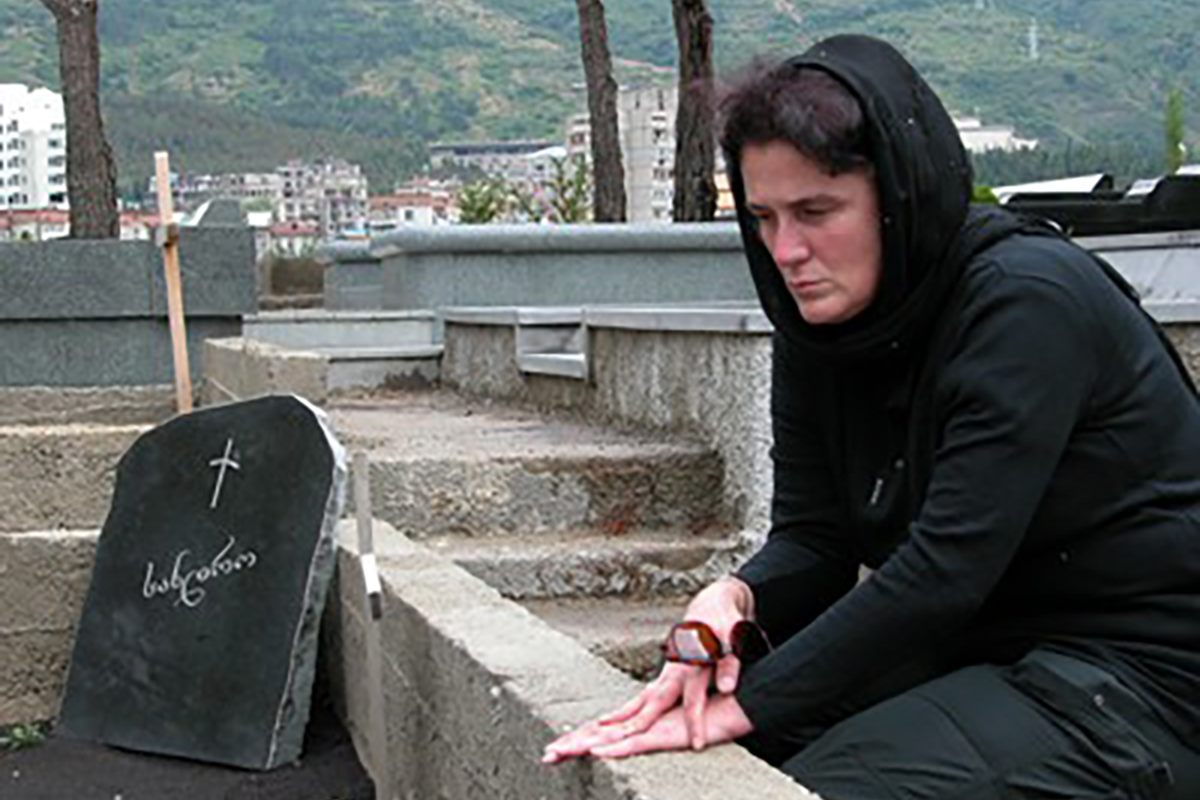
In April 2011, months before the Georgian Dream coalition swept Saakashvili’s UNM from power, the European Court of Human Rights arrived at a damning ruling implicating Saakashvili in ‘preventing justice from being done in this gruesome homicide case’.
In January 2018, Tbilisi City Court found Saakashvili guilty of obstructing justice and of offering Girgvliani’s murderers a presidential pardon.
‘I will never forget the eyes of Irina Enukidze or of those others who waited for justice to be done and did not see it in their lifetime’, President Salome Zurabishvili, one of the opposition leaders back in 2007, said shortly after Saakashvili was apprehended by the authorities in October this year.
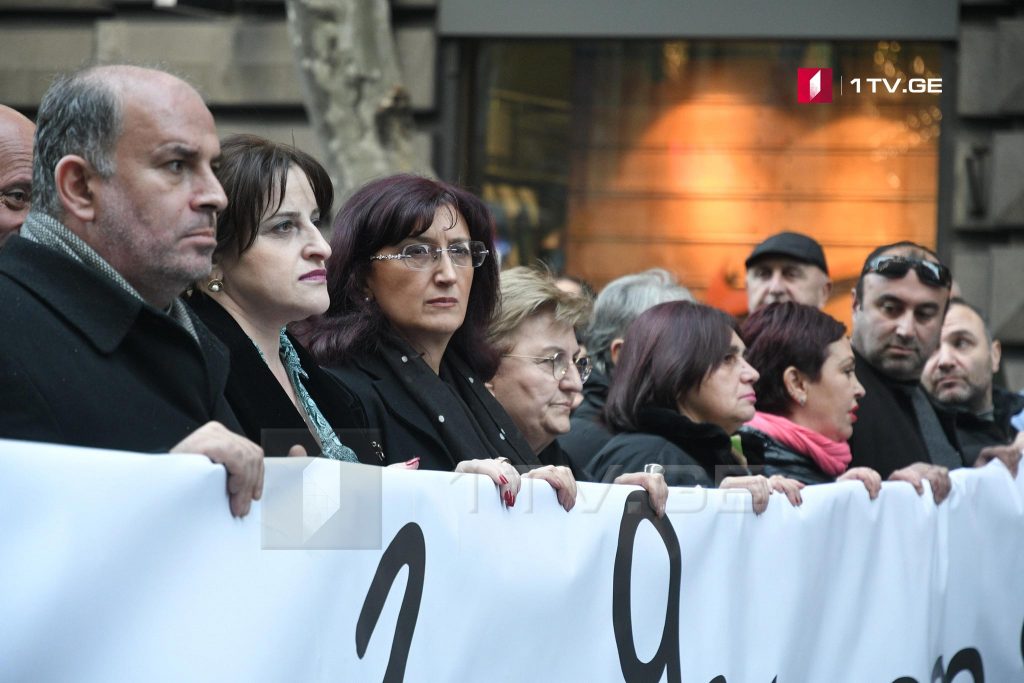
By November 2007, Imedi had also covered two uninvestigated police killings besides the Girgvliani murder: the shooting of Zurab Vazagashvili and Aleksandre Khubulovi a year earlier and the 2004 cover-up of police erroneously killing 19-year-old Buta Robakidze.
‘Georgia did not have a criminal for a president’
Following eight years as a fugitive, Saakashvili was apprehended by Georgian law enforcement agents on 1 October 2021 after smuggling himself into the country. He has since been serving his 6-year prison term over cases in which he was convicted in absentia.
In January 2018, a Georgian court found Saakashvili guilty of abusing his presidential powers by helping the head of the Georgian Constitutional Security Department, Data Akhalaia, to avoid the prosecution and illegally promising to pardon four law enforcement officers convicted of murdering Girgvliani.
In June that year, he was also found guilty of ordering an assault on opposition MP Valeri Gelashvili in 2005.
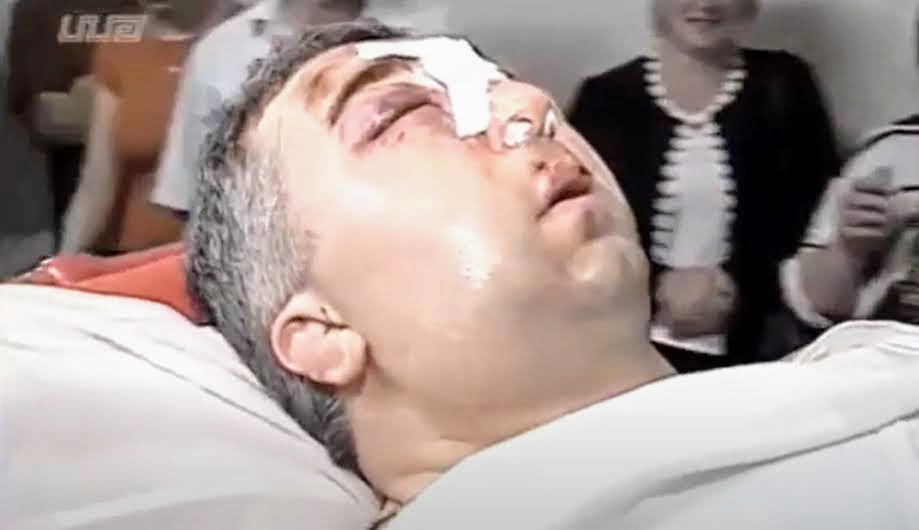
In addition to the November 2007 events, Saakashvili faces further charges of embezzling more than ₾9 million ($2.9 million) during the last five years of his rule, and for illegally crossing the state border after he smuggled himself into Georgia this September.
In conversation with OC Media, Shota Tutberidze, Saakashvili’s lawyer, insisted that the charges levied against the former president over the 2007 events were ‘based on indirect testimonies’ and ‘hearsay’.
Tutberidze said that the Prosecutor’s Office had based their claims of power abuse on the military’s alleged involvement in the dispersal of protesting crowds. Tutberidze insisted that no such thing happened.
‘There were some [military] units mobilised that blocked Rustaveli Avenue over security concerns but none of them participated in breaking up [the protests]’, he said.
‘The Prosecution relies mostly on TV footage [of protests being broken up], which is hard to watch, but there is no evidence in the case suggesting the personal liability of Saakashvili’.
On 7 November, military vehicles were seen in the centre of Tbilisi throughout the day. Zaza Gogava, who at the time was chief of staff of the armed forces, was also spotted on Rustaveli Avenue. Soldiers, however, did not directly engage in the dispersal of demonstrations but helped law enforcement secure areas, including Liberty Square.
Tutberidze reiterated Saakashvili’s claim in court that he was only following developments in Tbilisi on 7 November on TV, while his Interior Minister, Vano Merabishvili ‘was in charge’. He added that other cases in which he has already been convicted suffered a similar problem of ‘indirect witnesses’ testifying against him.
In several recent appearances before the court, Saakashvili has called the criminal cases against him politically motivated, insisting that he was the ‘personal captive of Putin’.
He has also long claimed that Russia was behind the 2007 opposition protests.
In court on 29 November, Saakashvili accused the late Patarkatsishvili of acting on Russia’s instructions. He also claimed that the Georgian authorities had been warned by the FBI that Georgian ‘thieves-in-laws’, organised criminals, had mobilised on the eve of the anti-government protests.
‘There are a lot of mistakes that I deeply, deeply regret’, he said, ‘ I again apologise. But making mistakes is one thing, and committing a crime is another. I am Mikheil Saakashvili and Georgia did not have a criminal for a president!’
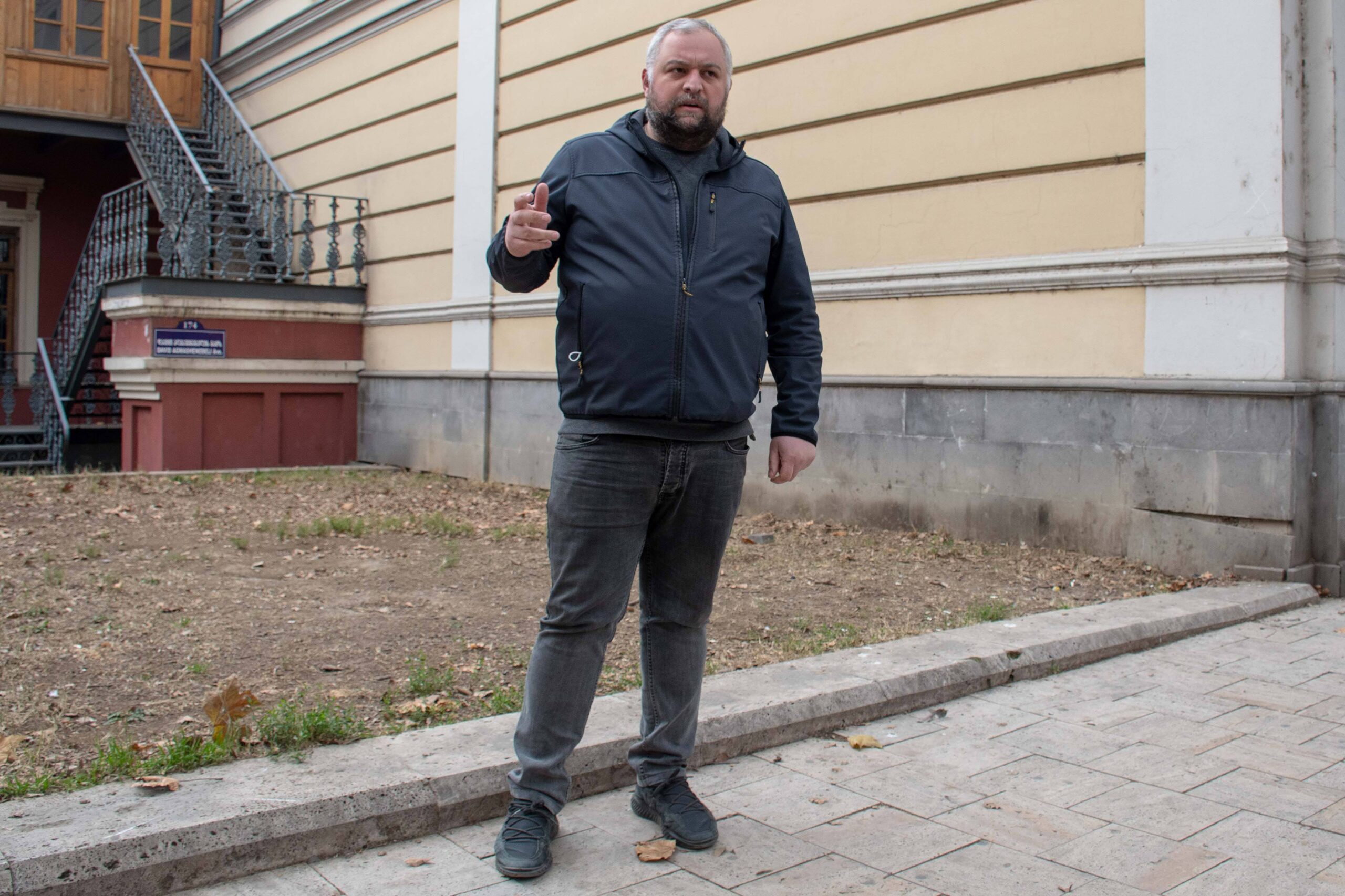
But for Nika Didishvili, wounded by police in November 2007, there is little doubt that the right man is on trial.
‘We just want rule of law and justice for all; this is our biggest sentiment and hope’, he said.







